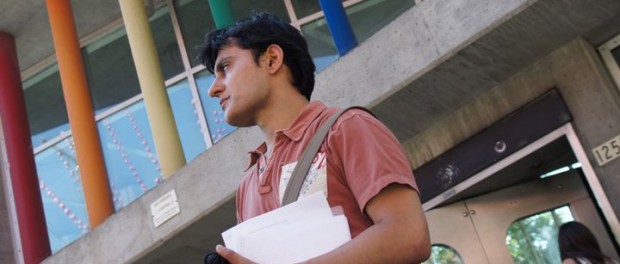Through My Brown Gay Lens: I Do and Yes I Do
Growing up in a country where marriage meant a five day ritual that included hundreds of people, when I came out to my mother, her adorable response was that I must find a responsible South-Asian boy with good family values. As I added years to my life, I learnt what marriage meant to people around the world and how it’s different across cultures.
Marriage has the typical religious, godly connotation to it: a commitment for life, undying shared love, a world of responsibilities, creation of a family, union between man and woman and the rather hetero-normative list goes on. However, at the core of what marriage is, as my Socialist father once told me, is a social contract that binds you into this labyrinth of rights, obligations, benefits and sometimes oppressive principles. So when I did realize that marriage was all of the above, why as a gay (brown) man did I need to appropriate this very ‘hetero-normative’ virtue and make it my own? Why couldn’t I just let the straight people keep marriage for themselves and enjoy the genderless world of equals that I had proudly created for and around myself?
I didn’t have an answer to this question for many years. My own socio-sexual evolution was a product of continuous questioning and counter-questioning. But after a lot of internal and external debate I came to the epiphany moment of why as a gay man, the right to marry someone I want, was important to me.
While my respect for people who don’t feel the need to conform to this age old (perhaps archaic) institution remains undiminished, I came to the conclusion that I didn’t want to be deprived of the ‘social and legal’ right to marry someone. I will purposely leave religion out of this discussion, simply because my non-religious leanings make me utterly incompetent in indulging in discussions about religion.
The explanation of it was simple. I walk down a street in my neighbourhood every day. The street is open to everyone without discrimination. There would be no one in the world who is told by decree, law or practice, “Don’t walk down that street.” The origins, ownership, and status of the street are quite inconsequential and the basic social, human creation of this “street” makes it free and available for everyone to walk on. Some may find it beneficial, others arduous, while others would remain quite detached to its existence.
This basic idea somehow stuck with me. Marriage is a street that everyone has the right to or not to tread. The complexity of the social construct around it, the largess of man made laws that are deemed its “benefits,” makes it a necessary for equal access by everyone.
The recent United States Supreme Court decision (a really nail-biting finish of 5:4), that in one stroke legalized same-sex marriage across a large country like the US, for me meant just one thing; the victory of individual liberty. The freedom to walk down that street.
The core of the argument for gay marriage for me is freedom, individual liberty. It’s about the right of every human being to decide for themselves. The purpose of our world is and should be for every person to have the freedom to live the way they want, decide for themselves, what works for them and yes marry, if they want. Having said this I wouldn’t really care what the institution is called. It’s the lack of an equal, fundamentally equal alternative that makes gay marriage such an issue about social, civil and legal equality.
More importantly, while the US was celebrating a momentous event in their LGBTQ rights movement, I checked and even today over fifty countries around the world have laws that either designate same-sex activities illegal and punishable under statute and there is rampant discrimination against LGBTQ (including in North America and Europe). So while the jury will still be out on whether the appropriation of a historically hetero-normative institution is the best thing for LGBTQ activism, the state of the world makes the fight for equal marriage rights for LGBTQ people even more important.
Let’s say hypothetically someone tomorrow is able to make a long list of all the laws and rules that provide for legal and social rights to all people, regardless of their sexual orientation. Would I still insist of being given the right to marry? I think not. I am not of the school of thought where the paper proof of marriage is personally important to me. But even then I don’t want to be denied the right to have a big South Asian wedding, where both my groom and I will dance to the tunes of Bollywood. Thus till that time when every single civil, social and legal right and benefit that is available to one, isn’t made available to all, my right to sign the contract of marriage remains inviolable.
Sinj Karan is a writer and filmmaker in Montreal.
1 Comment on Through My Brown Gay Lens: I Do and Yes I Do
Comments are closed.






Couldn’t agree more!